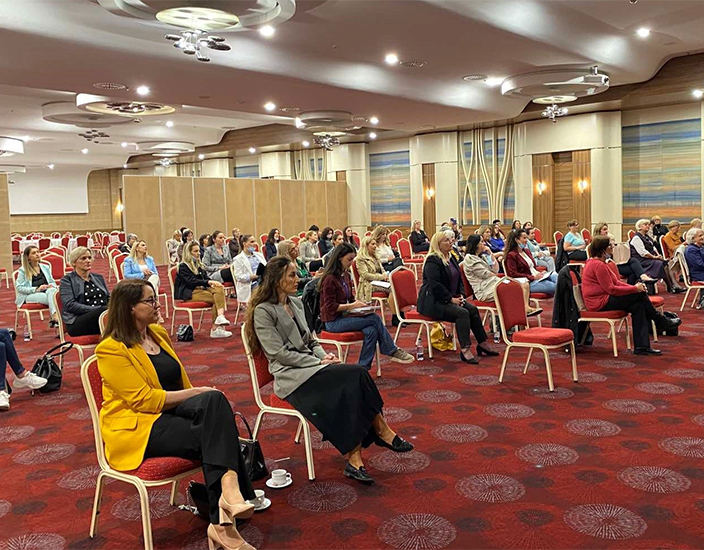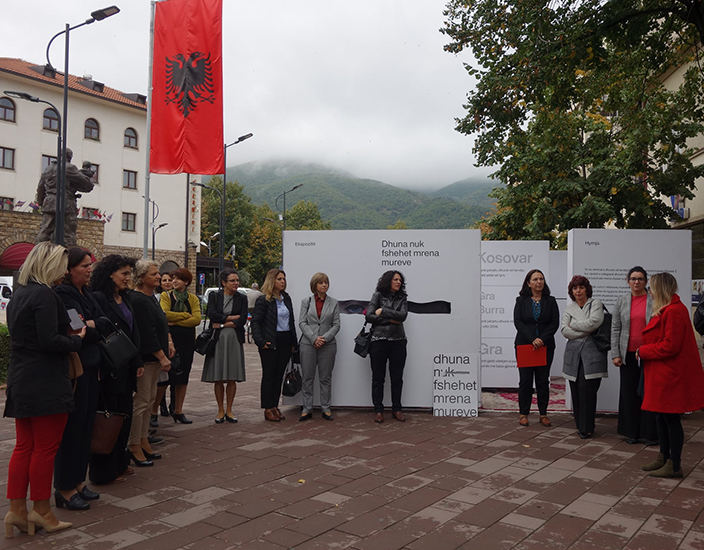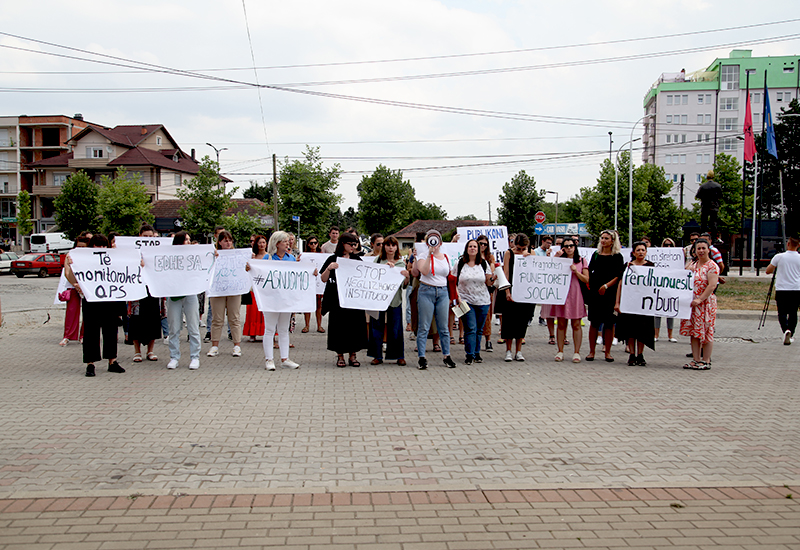Founded in 1996, Kosovo Women’s Network was originally an informal network of women's groups and organizations from different regions of Kosovo. Since its inception, KWN has developed into a network advocating for Kosovo women, locally, regionally, and internationally. Representing the interests of its 168 members, including women's organizations of all ethnic groups from across Kosovo, KWN is a leader among civil society organizations in Kosovo and the region.
In an interview with Etleva Malushaj, Coordinator of the Kosovo Women's Network project "Strengthening women's participation in politics" supported by the EU, we discussed her personal motivation to join the nonprofit sector, what are their current activities and she also explained why it is important for their network to strengthen the feminist movement in Kosovo.
How was your association established? What changed from the beginning to this day?
Etleva: In 1996, our organization was initially an informal network of women's groups and organizations from different regions of Kosovo. However, in 2003, activists felt the need to establish a more formal and structured network. Therefore, they decided to form the Kosovo Women's Network (KWN) that advocates on behalf of women at the local, regional, and international levels. Over time, our organization has grown and expanded and now represents the interests of 168 member organizations including women's organizations of all ethnic groups from all over Kosovo. In 2012, KWN established the Kosovo Women's Fund (KWF), which provides small grants to women's rights organizations that aim to promote gender equality, especially in rural areas and for marginalized groups.

KWN member's meeting
What was your motivation to work in the nonprofit sector?
Etleva: This sector has had and continues to have great importance in state building and democratization of our country. Civil society organizations in Kosovo have created space to raise a wide range of important topics and issues that are often unpopular and unsupported.
KWN, among other things, aims to ensure equal active and effective participation of women and girls in the political, economic, and social life of Kosovo. We advocate for the rights of women and girls in all aspects of life. Further, our organization works to empower the women and girls’ movement through solidarity and mutual support. KWN is also committed to achieving the involvement of women's groups in regional and international initiatives to promote the rights of women and girls in Kosovo.
How did the COVID-19 crisis affect the organization’s work? How much has the way you operate changed? What activities were you focused on recently?
Etleva: Certainly, the pandemic has affected the work of our organization by limiting our activity and disabling physical meetings with our members. However, in terms of public health, we have tried to organize our work and activity online through various platforms. Of course, we have been constantly worried because the pandemic has made women’s lives the most difficult. Their health has been more at risk as they are more represented in health and other essential sectors. Many women have lost their jobs and faced economic hardship. Also, during this time, cases of domestic violence have increased, and women have been endangered, in addition to the pandemic, also in the premises of their home. We as an organization have carefully monitored the situation in Kosovo and moreover we have prepared a research report "Pandemic does not recognize gender" in which we have made a budget analysis assessing the response of the Government of Kosovo to the Covid-19 pandemic from a gender perspective.

KWN Exhibition Peja 2019
We have also actively advocated in the Government of Kosovo to heed these recommendations, including the allocation of funds to support women in need during emergency situations. We have reallocated the resources available to us to address the situation created with Covid-19 specifically by facilitating the transfer of resources to small organizations working with marginalized groups in the Western Balkans. These organizations have made efforts to address gender-based violence as well as gender discrimination in relation to work that has increased because of the pandemic and measures taken by the government. In addition to providing grants, we have also worked with shelters and service providers in Kosovo and Serbia to develop a tele-counseling guide that would enable women to receive psychological counseling during isolation in a safe manner. We have also raised funds to provide digital equipment to our members during the pandemic.
Which activities are you most focused on at this moment?
Etleva: The mission of the Kosovo Women's Network is to support, protect and promote the rights and interests of women and girls throughout Kosovo, regardless of their political, religious, or ethnic background, age, level of education, sexual orientation, and ability. KWN accomplishes this mission through the exchange of experience and information, partnerships and networking, research, advocacy, and services.
In terms of achieving its mission, KWN has drafted a Strategic Plan for 2019-2022. This strategy guides KWN's work during this period and focuses on six program areas:
- Strengthening the Feminist Movement in Kosovo;
- Women in Politics and Decision Making;
- Women's Rights in Health Care;
- Life without gender-based violence;
- Economic Empowerment of Women;
- Improving Access to Quality and Sensitive Gender Education.
How is your association funded? Which types of donors do you work with the most, and how? How can someone support your work?
Etleva: KWN is generally supported by international organizations for the empowerment of women. We also have a group of individual supporters who contribute to our organization. The most important thing for us is to have supporters who are partners and work with us to fight the traditional gender relations of power, aiming at the necessary changes in society.
Anyone who believes in our mission for an equal society can contribute by clicking on this LINK.
How does your organization contribute to the development of philanthropy in Kosovo?
Etleva: We as an organization consider that it is very important to work and seek a new way for nonprofit organizations to have a stable and long-term funding. As we have considered philanthropy as a necessary option, we have developed a philanthropy program within our organization that aims to develop alternative funding strategies for KWN and our member organizations. In this effort, we have tried to cooperate with other organizations and have been participants in several activities aimed at advancing philanthropy in Kosovo. We think that coordination between civil society organizations is crucial to advocate for a broader philanthropy strategy in Kosovo. We have also tried to promote the existing legal framework in the private sector, including businesses and individuals. It is extremely important to raise awareness in support of programs that contribute to the community and overall well-being. In the course of our work, we have recently prepared a research report "Where is the money for women's rights" which examines funding trends for women's rights organizations in the Western Balkans.
As concrete initiatives, we have worked with our member organizations and organized fundraising campaigns from local businesses to raise funds for dedicating them to scholarships for girls at the Buçinca Foundation as well as shelters. We have an ongoing partnership with the East-West Management Institute as a fiscal sponsor in the United States that enables people there to make tax-exempt donations. We have also built a group of individual supporters who have supported the work of our organization for many years. KWN is constantly working to expand this group by trying to encourage others to support our cause.
Do you cooperate with other nonprofit organizations? Can you tell us more about that?
Etleva: If we function as a network of our member organizations, we are necessarily in constant interaction with women's organizations, also our members. However, we also work closely with other civil society organizations on issues that involve the interests of women and girls in Kosovo and beyond. As a current example we can take the initiative to create a platform of civil society organizations to seek accountability and transparency in the Kosovo-Serbia Dialogue. KWN, as part of this Platform, ensures that it conveys the priorities of women and girls as well as seeks their equal involvement in this process.
As part of research reports, we have also worked with groups of women from the region and with global collaborators to advocate for better funding for women's organizations and feminist movements.
What are the biggest challenges you face?
Etleva: The main challenge remains the eradication of social and cultural norms which prevent the equal inclusion of women and girls in the public sphere, guaranteeing them a dignified and non-violent life. The lack of implementation of the law on gender equality that guarantees equal inclusion of women in decision-making processes remains problematic.
Another challenge is the fact that women's civil society organizations at the local and central level continue to face financial difficulties. Access to finance has been even more problematic for organizations working in rural areas and those of women with disabilities who play a crucial role in protecting and promoting women's rights. Further, difficulties arise when there is a lack of harmonization of the legal framework and facilitation of procedures that encourage the support of civil society organizations by individuals and the business community.
What do you consider your greatest success and what is next?
Etleva: KWN has contributed proposals during the drafting of several laws and policies from a gender perspective, including very important laws that address gender-based violence. An important success is the strengthening of the feminist movement in Kosovo by constantly increasing the number of girls and boys who are part of this movement.
Since the post-war period, Network activists have worked and advocated for gender quotas to ensure women's involvement in politics. Since its beginnings, KWN has taken many initiatives to ensure women's representation in decision-making processes. An extraordinary success were the elections of 2021, in which 43 women were elected members of the Assembly of Kosovo, an increase from 32.5% to 35.8%. In these elections, 34 women were elected MPs without the need for a gender quota. This result has shown that the gender quota has created opportunities for women to be involved in political processes. In some cases, women who won the mandate for the first time through the quota, in the next elections have managed to win through the popular vote without the need for a quota.
Finally, for the first time, KWN, through KWF, is providing organizational support to member organizations, which means that member organizations can receive substantial support to enable them to achieve the overall strategic plan and goals for gender equality.


Leave a comment